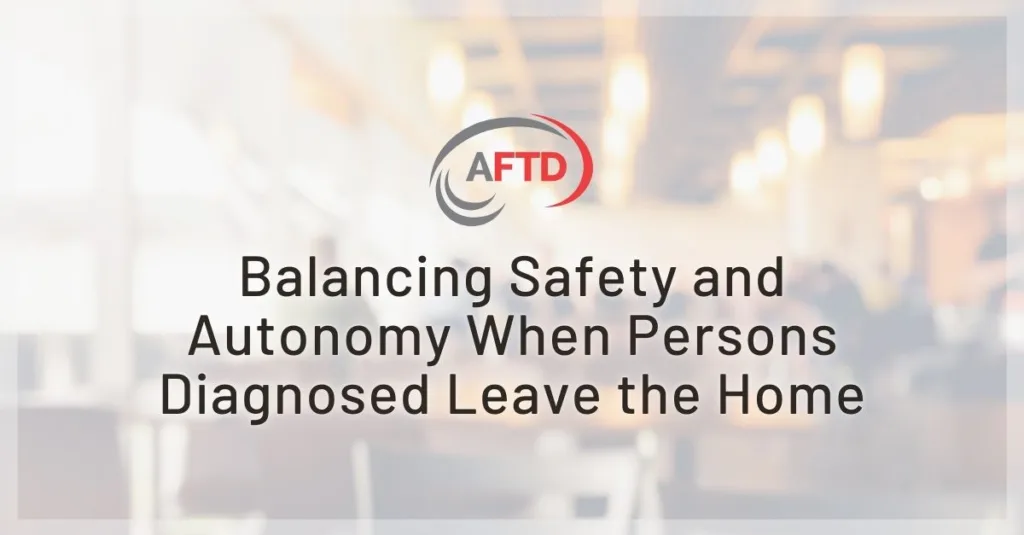Balancing Safety and Autonomy When Persons Diagnosed Leave the Home

In recent days, national media outlets have reported on the disappearance of Edmond Bradley Solomon III, a 66-year-old South Carolina man living with an FTD diagnosis, in Mexico. Mr. Solomon was on a cruise with his wife when he disappeared on April 3, shortly after their ship docked for the day in Cozumel, one of Mexico’s most popular tourist destinations. In a matter of moments, a pleasant family vacation turned into a frightening crisis.
AFTD extends our greatest sympathies to the Solomon family as they continue their search for their missing loved one. We have seen in our support groups an outpouring of concern and support for the Solomons from our community members, who know all too well the enormous stress and challenges brought on by an FTD diagnosis.
FTD is a neurodegenerative disease that affects the frontal and temporal lobes of the brain. Changes in language, decision-making, and the ability to anticipate the consequences of one’s behavior, coupled with impulsivity, can create challenges navigating in the community. Taken together, FTD symptoms contribute to potential safety risks that every family must balance, especially early in the disease.
For example, persons with FTD may become more risk-prone, due to an inability to perceive potential dangers. In some cases, having lost their sense of social norms, they may unwittingly put themselves at harm by saying offensive or provocative remarks to strangers, or by invading their personal space. Being in crowded environments can cause overstimulation, with unpredictable results and language difficulties can make persons diagnosed unable to communicate their needs. They may be lost, hungry, and scared, but are not able to find the words to convey the severity of their situation.
Exacerbating these challenges is the fact that people with FTD can present as “normal” – young, physically able, and of sound mind – and therefore not in any obvious distress. FTD symptoms can also present differently from day to day, making it difficult to predict a loved one’s behavior at any given time. Changes in routine and stress can trigger symptoms that were otherwise masked at home.
It can be challenging – emotionally and logistically – for families to ensure a person’s safety while allowing them the autonomy they have enjoyed their entire adult lives. Yet remaining engaged with family and friends, pursuing one’s interests, and taking part in enjoyable activities in the community are what give life meaning and joy.
While no plan can fully account for every possibility or fully eliminate risks, families can take steps to facilitate safe enjoyment of activities and travel:
- Learn about FTD and the different ways behavior and language changes may manifest themselves.
- Consider responses or reactions you have seen in past situations with the person diagnosed. How do they respond in a crowd, or to noise? What reassures, refocuses, and calms them when stressed?
- Adjust the pace, timing, number of activities, or size of social gatherings to a more moderate stimulation level.
- Ensure the person diagnosed carries or wears a medical alert, ID, and emergency contact information.
- Use Apple AirTags or other GPS-enabled technology for tracking.
- Share travel plans with other family members and trusted friends.
- Coordinate with local law enforcement and/or TSA officials before traveling.
- Have the person diagnosed wear the Hidden Disabilities Sunflower to alert others that they have a disability that is not immediately obvious.
- Caregivers should consider joining an FTD support group or forum, both for emotional support and practical tips and suggestions.
AFTD will continue to work diligently with our partners at home and abroad to increase awareness and understanding of FTD and promote compassionate care until there is a cure. To speak to a trained AFTD staff member about any aspect of FTD, please contact the AFTD HelpLine (866-507-7222, info@theaftd.org).
AFTD will continue to monitor the Solomon family’s situation as it unfolds. Staff and volunteers have reached out to contacts in Mexico and the family as a resource on FTD. We extend our most heartfelt sympathy to the Solomons, and hold them in our thoughts with hope for Mr. Solomon’s safe return.
By Category
Our Newsletters
Stay Informed
Sign up now and stay on top of the latest with our newsletter, event alerts, and more…
